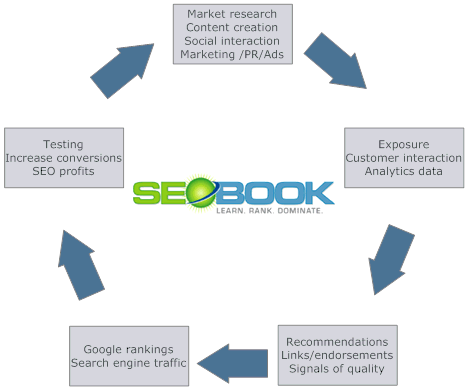I've been able to get near-instant top Search Engine positions - and hold them - but I wouldn't use this technique broadly until I understood why - and that secret was only disclosed to me recently.
The story goes like this:
I've laid out the complete theory of social-outpost-publishing, in and among some other data.
The short version:
- Write a blog post.
- Post it as an article, preferably on ezinearticles.com
- Convert it to a podcast and post to archives.org
- Create a Powerpoint and post to slideshare.net
- Combine with podcast and create a slidecast on slideshare.net
- Create a video from the podcast and slideshow and post to YouTube
- Take all these links and create a Squidoo lens
- Update your blog post with these links
- Release a press release telling all about it and include the above content links.
But I wouldn't use it broadly until I understood why. (Having a piece of the puzzle doesn't solve the whole jigsaw mess on the table.)
This post by SEO Book now gives the complete clue to its success:
Look in the bottom right-hand corner - "Recommendations, Links/endorsements, Signals of quality"
As they put it:
You typically have to create some number of social interactions to leave the trail of signals of quality to make Google want to trust a site enough to put it in front of a large traffic stream, especially if you are starting a brand new site and are trying to operate within Google's guidelines. As Bob Massa says "search engines follow people."All of the above places to post are social sites - or getting that way. Blogs, videos, podcasts - all social. Even press releases and articles (though not commonly thought of in this light.)
You'll also notice that the sites posted to above are all heavy hitters with tons of pages on them.
What you are doing with this social outpost theory is posting inbound links on huge sites which all use the same link/keyword and post back to your little, unknown site. And so Google first finds these social sites and then finds your little site. What stays up is the little site, not necessarily the social sites.
Michael Campbell explained it some year ago with how people could use Digg to get their site ranking - but again, never said why it worked, just that it did.
Here's why -
- "Search Engines follow people."
- Large sites are given more authority ranking by Google.
Why do your social posts disappear off Google? Because they themselves have to be "voted up" by the public. Until they do, they don't have authority. They'll show up to begin with, but later on, they'll be lower down the results. Like Alice's Cheshire Cat - all that's left is the smile.
But your site will be up there because of the links into it - which means authority sites "approve" of what you are doing.
I could go on and on with examples - but the above gives you the gist of things.
You can try this (as I'm about to relaunch quite a few project I've had simmering on back burners) but ensure that you have your backend ready first (a Word Press blog and ZenCart ecommerce engine - both SEO optimized for the keywords you are using).
Then test out the whole thing with information products - all given away as ethical bribes to get them subscribing to your autoresponder list.
Luck with this - Good Hunting!
- - - -
And if you think you could do better, if you have a better explanation - let me know...


No comments:
Post a Comment